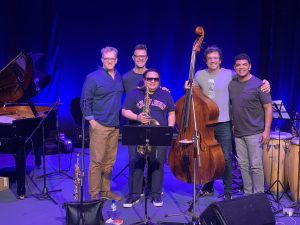
In April, Professor Stephen Anderson traveled to the Dominican Republic to perform with his ensemble, the Dominican Jazz Project, at the 2022 Jazzomania Jazz Festival. He was also honored by the Minister of Culture for his numerous compositions celebrating the music of the Dominican Republic, and for his teaching and research done in the country, Dr. Anderson has become a fervent ambassador for Dominican music and culture.
As stated on the certificate, this distinguished recognition is “for [Anderon’s] research and contributions to the national musical heritage. With his work, he has generated pieces and compositions whose contents are based on the roots of native Dominican music. In his [musical] works of fusion with jazz, our rhythms have traveled with our seal of identity.”
We reached out to Professor Anderson for an interview about this honor, his work with Dominican music, and more.
UNC Music: How did you find out that you were receiving this award and what does it mean to you?
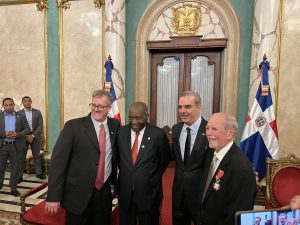
Professor Stephen Anderson: Carlos Francisco Elías is a diplomat in the Dominican Republic and passionate jazz lover who runs the Jazzomania Jazz Radio program in Santo Domingo and serves as director of the Jazzomania Jazz Festival. He has invited me to perform at the Jazzomania Jazz Festival on three occasions (2014, 2017, 2022), and he has been tremendously supportive of my compositions and work with the Dominican Jazz Project which fuse Dominican folkloric rhythms with modern jazz harmonies and aesthetics.
In the months leading up to the 2022 festival, Carlos released several news articles promoting the Dominican Jazz Project and the forthcoming events. One article announced the “condecoración” ceremony of our dear friend and band member, Guillo Carias, where he would be formally decorated by President Luis Rodolfo Abinader Corona (President of the Dominican Republic) at the Palacio Nacional on Thursday, April 28, 2022. We were excited that all members of the Dominican Jazz Project were invited to participate in the ceremony.
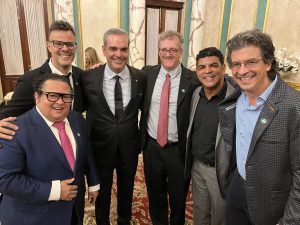
Another news article announced that I would be “galardonado” — awarded with a formal recognition and distinction by the Ministra de Cultura, Señora Milagros Germán, on the evening of our concert on April 29 at the Jazzomania Jazz Festival. It turned out, however, that she was called away with other governmental duties that evening, so the award was sent later with Guillo Carias when he returned to the United States.
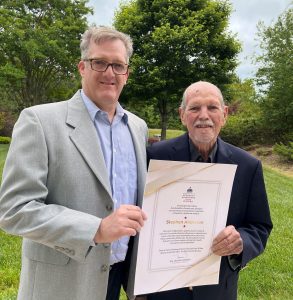
Another article from Carlos Francisco Elías that was released in different news sources, including on the front page of Areito, was “Stephen Anderson: Nuestro Mormón Tropical Puso la Música de RD en Alto.” Areito, (Jan. 29, 2022).
Receiving the distinction from the Ministra de Cultura, Señora Milagros Germán, as a representative of the government of the Dominican Republic is very meaningful to me personally as it recognizes the eight-year collaboration with my good friends and colleagues in the Dominican Jazz Project where we have worked closely together to create an aesthetic that is “based on the roots of Dominican native music” while composing new fresh modern music that has “traveled with the seal of [Dominican] identity” as was stated by Señora Germán on the award.
UNC Music: How and when did your love of Latin jazz, particularly Dominican jazz, begin?
Professor Anderson: I first learned Spanish at age 19 while living among the beautiful people of west central Mexico — many of whom lived in a level of deep poverty that most Americans will never witness in person. I spent two years serving a mission — many times on my hands and knees digging in the dirt to help fortify the widows’ mud huts, for example, or to help others who lived in palm tree huts closer to the coast to fortify their homes for the rainy season and doing various other similar services. The families who lived in the humblest of circumstances had no running water in their homes, had dirt floors, some of their children had little or no clothes, and in some cases, the children’s diets consisted of raw chili peppers. This was their daily reality. I was hospitalized with typhoid fever for three weeks at one point and became sick with amoebas on two other occasions.
But my soul was forever changed by that experience, and I wouldn’t change those memories for anything in the world. I loved the people.
After returning to the United States, I was first trained to play salsa in the mid-1990s in a band with Colombian musicians who were living in Utah while I was working on my undergraduate degree in music. My bandmates were mechanics and day laborers by trade, but they loved and knew the music of their homeland well, and they taught me how to play my first montuno patterns. From that time on, I have always sought opportunities to befriend musicians from various Latin American countries and to ask them to teach me about the music and culture of their respective homelands. Reflecting now, over 25 years later, I have always found these friends to be genuinely supportive and inclusive about inviting me to perform with them.
In the world of jazz, when playing “Latin jazz,” most jazz musicians and jazz audiences are primarily only familiar with music that comes from the Cuba and Puerto Rico son and salsa traditions and from Brazilian samba and bossa nova. I love this music, obviously, as I have performed it for years. But what has captivated my interest since I was first invited to perform at the Jazzomania Jazz Festival in 2014 with Dominican musicians, is that their native folkloric rhythms, such as pambiche, mangulina, sarandunga, palo, and merengue opened up a new world for me, as the grooves were different than the Latin music that I had known previously. I have felt strongly since that time that the jazz community and the rest of the world, for that matter, would benefit from also becoming more acquainted with the music of the Dominican Republic. I have thoroughly enjoyed the process of exploring this music while trying to imagine new directions that the music could take when merged with jazz.
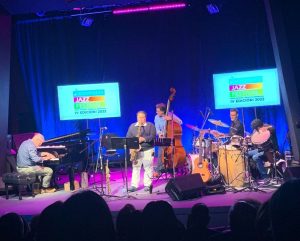
UNC Music: What has been one of the most surprising things you’ve learned through your research and performance?
Professor Anderson: What surprised me the most when I first started working with Santo Domingo musicians, Guy Frómeta, Sandy Gabriel, and David Almengod, was how much we had in common. They knew well and were inspired by the same modern American jazz musicians who had inspired me growing up, and consequently, our aesthetic of fusing Dominican folkloric rhythms together with modern jazz came together very quickly and naturally. We were also very similar interpersonally. In spite of growing up in two very different countries with varied cultural experiences, we all had families, and we were very similar in our sense of humor as well as in our hopes and dreams and musical aspirations.
UNC Music: What is your favorite memory of your research and performance of Dominican music?
Professor Anderson: My favorite memories with the band are the great times we’ve had performing together and seeing audiences be excited to hear and dance to our music. My colleagues are very funny, as well. They love to laugh, which makes traveling with them a lot of fun.
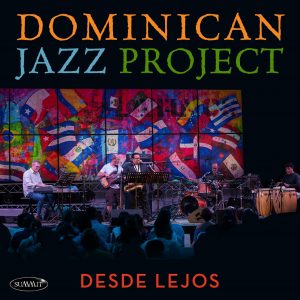 UNC Music: What are your hopes for future research and performance of this music?
UNC Music: What are your hopes for future research and performance of this music?
Professor Anderson: Our recent Dominican Jazz Project Summit Records CD release, Desde Lejos, which was recorded remotely between the Dominican Republic, Cuba, Puerto Rico, and North and South Carolina during the pandemic received several favorable reviews from critics in various jazz magazines, and the CD spent 7 weeks in the top 50 radio charts on JazzWeek, which measures radio “spins” nationally. We are hopeful that this excitement in the media about our recording will result in more touring and performances at festivals outside the United States and the Dominican Republic.
UNC Music: Is there an upcoming project that you’re most excited about?
Professor Anderson: I am very excited about my forthcoming project which is an invitation to compose symphonic work that features the four talented percussionists of the Tamborimba (percussion) Ensamble together with the Orquesta Filarmónica de Cali in Columbia, South America. The Orquesta Filarmónica de Cali premiered my work, Concerto for Puerto Rico, July 2019 which I composed for my dear friend and UNC faculty colleague, Juan Álamo. The Tamborimba Ensamble has requested that I compose a similar feature for them that draws upon Colombian folkloric music.
UNC Music: What is the biggest thing you hope listeners take away from this music?
Professor Anderson: I like what some of the critics wrote about the Desde Lejos recording which I feel appropriately sums up how I feel about the music and my colleagues in the group, including our bassist and dear friend, Jeffry Eckels, who died a few months before we began recording:
“This music [is] spirited and joyful, even in the face of COVID and so much death and sadness. This music is healing. These songs uplift and give hope.”
—Dee Dee McNeil, Musical Memoirs August 2021
“Best of the Best”
“…a reminder of the power of music and brotherhood.”
—Mark Sullivan, All About Jazz
“Personal loss and physical separation couldn’t dim the spirit of The Dominican Jazz Project. Every bit as remarkable as the vibrant, passionate music on Desde Lejos…is the mere fact of its existence [i.e., due to the pandemic].”
—Michael Roberts, JAZZIZ
The past few years have been so difficult for people across the world. Music has the power to lift our spirits and bring joy into our lives. My sincere hope is that our music will bring joy and happiness to them as it does for us.
by Catherine Zachary, ’10
